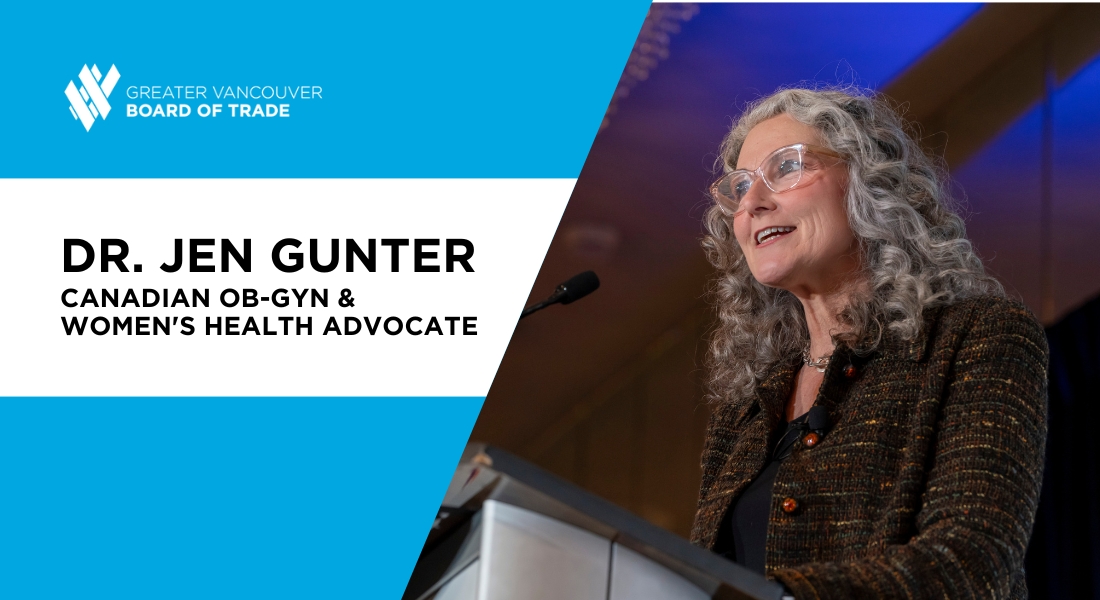The M-Word

Menopause – 1 word, 9 letters, 3 syllables, and a significant transition that all women go through that doesn’t receive the attention it deserves. So why are we, at the Greater Vancouver Board of Trade talking about it? What does it have to do with the business community or the economy at large?
Each year a monumental $3.5 billion in wages and $237 million in productivity is lost when women don’t have the support and resources they need to manage their menopause-related symptoms. These figures are not just numbers; they represent the potential and expertise of women who are essential to our organizations and communities. An economy can only be healthy and thriving when its people are healthy and thriving. This is why health, including women’s health, is a business issue.
Before we go any further, let’s go over the basics.
Menopause is defined as the day when there have been no menstrual periods for 12 months, marking the end of reproduction. It typically occurs between the ages of 45 and 55, although the exact timing can vary.
The three stages of menopause (or the menopause transition) are: perimenopause (hormonal changes that can begin up to 10 years before the final menstrual period); menopause (defined as the date of 12 months of no menstrual periods, marking the end of reproductive years); and post-menopause (the years beyond menopause).
Common symptoms of menopause include changes in menstruation (i.e., irregular and heavy periods); vasomotor symptoms (i.e., hot flashes; night sweats); sleep disturbances; mood changes; changes in cognition and memory; to name a few.
Women experience symptoms to various degrees and often at the expense of their quality of life and employment. Because we don’t talk about the M-word, there is a reluctance to seek help or openly discuss their symptoms. Symptoms are often conflated with symptoms of other health conditions, further exacerbated the challenges.
Since women make up 48% of the paid work force in British Columbia and contribute approximately 43% of all hours worked in the province in any given week, it’s no wonder the figures above are so staggering. Midlife women between the ages of 40-65 make up 46.3% of all women workers and these are women that are at the peak of their careers, taking on important leadership roles.
At GVBOT’s annual Health Care Forum on November 1, 2024, presented by Pacific Blue Cross, the Vancouver business community came together to talk about how to support women to thrive and be successful in the workplace during this often-challenging time in their health journey.
Keynote speaker, Dr. Jen Gunter, renowned Canadian OB-GYN and women's health advocate, broke down what people experience during the menopause transitions and how it affects everything from work to caregiving, mental health, and day-to-day life.
After Dr. Gunter's talk, a panel of experts shared tips for employers on how to better support midlife women at work, with practical solutions to make sure their knowledge and expertise aren’t lost during this crucial time, so that they can continue to lead and contribute to communities and workplaces. They also explored the findings of the Health and Economics Research on Midlife Women in British Columbia (HER-BC) study. Here are some of the highlights:
- There are more than 875,000 women in midlife (40 to 65 years of age) in B.C., who are in the age range for menopause.
- The HER-BC study found that symptoms of menopause influenced how well people could be at work:
- A third of those surveyed (32%) indicated that the presence of menopause symptoms affected their job in some way.
- A quarter (24.8%) reported missing days of work in the last 12 months due to menopause symptoms.
- 17.2% had to cut back work hours during the last six months due to menopause symptoms.
- Almost one in 10 (9.4%) reported having to turn down a job promotion or career advancement in the last half year due to menopause symptoms.
- As many as 10% of women in Canada leave the workforce entirely due to unmanaged menopause symptoms.
The data is clear: the menopause transition is more than a health issue—it’s a workplace issue, an economic issue, and a community issue. Untreated symptoms affect productivity, career progression, and the ability to fully participate in the workforce. For a province like British Columbia, where women represent nearly half of the paid workforce, addressing this challenge isn’t just the right thing to do; it’s a business imperative.
At the Greater Vancouver Board of Trade, we believe that fostering inclusive, supportive workplaces benefits not only employees but also the organizations that thrive on their talent and expertise. By educating ourselves, normalizing conversations around menopause, and implementing practical solutions, we can ensure that midlife women continue to lead, innovate, drive economic growth and experience an overall better quality of life.
Watch Dr. Jen Gunter’s keynote address: